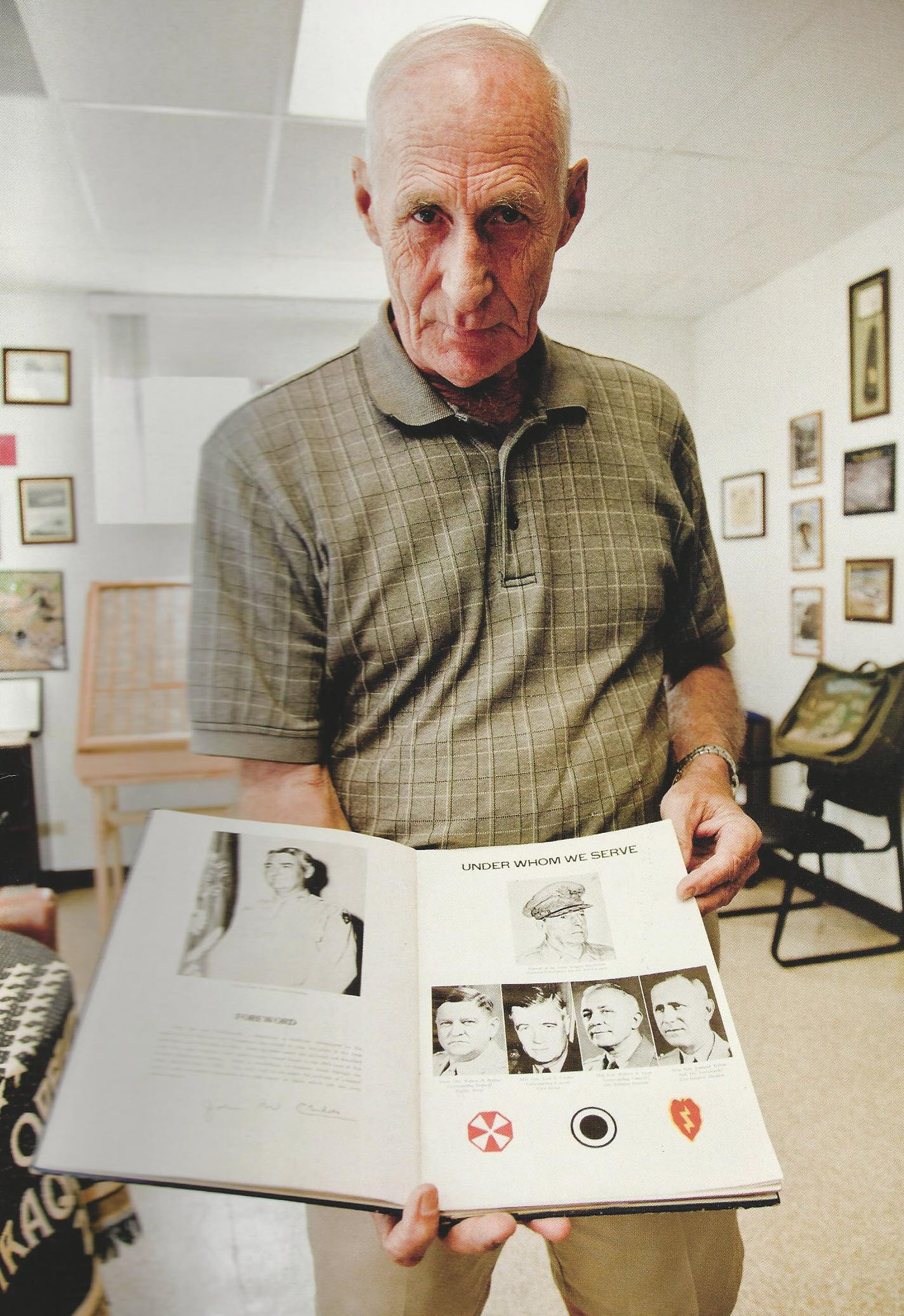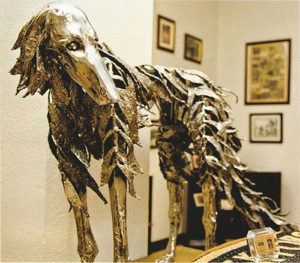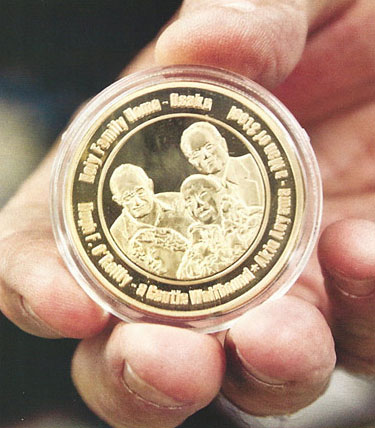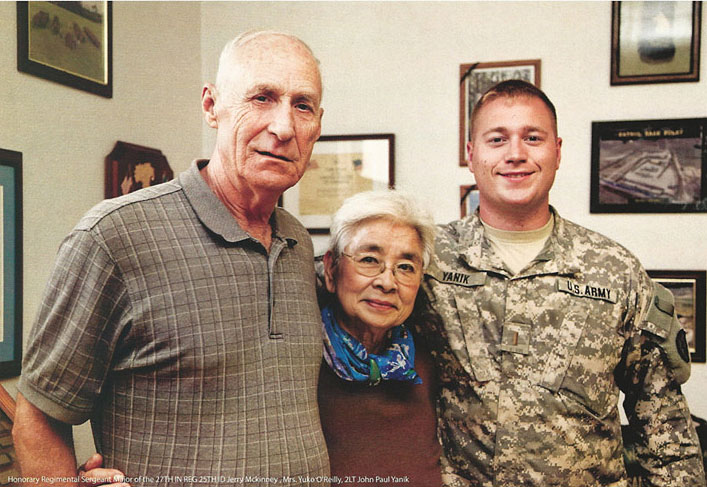Wolfhound and Holy Family Home History
as told by Jerry McKinney and Yuko O'Reilly
From Local Magazine Hawaii, July 2011
By Aaron Ohama (Photos by Keoki)

We have all been asked a question that we thought we knew the answer to, but after thinking for a moment about it, realized we didn't. "Tell me one good thing that has ever come out of war?" My immediate reaction was to respond with numerous examples of great things that were gained as a result of war. There were so many that I wouldn't even know where to start. I took a moment to think about how the rest of this conversation was going to play out. It would ping pong back and forth with different views, and points, the conversation would stray and eventually end without any answers. No, this one would need to be answered with a very specific example of good that came out of war. I looked back and prepared to deliver my profound example of goodness that could not be denied. I squinted my left eye, and pushed my cheek up with the corner of my mouth while sucking air through my teeth and answered; "well, um, I know there's something:' The moment to shine had passed, I had nothing. It became my goal to find an answer to this question.

"Nec Aspera Terrent" translates to "Frightened by no Difficulties" or "No Fear on Earth:' This is the motto of the 27th Infantry Regiment, the "Wolfhounds." The word "Aspera" is Latin for "work" or "difficulty" and "Terrent" for "fear", the same root as "terror". My first thought was that this was referring to a difficult time in battle or a "no fear" attitude in combat. The Wolfhounds have proven themselves to be "Fierce in Battle" dating back to World War I serving in Siberia in 1918. Stationed in Hawaii, they were some of the first to fire back at attacking Japanese war planes during Japan's attack on Pearl Harbor. There is no doubt the Wolfhounds are "Frightened by no Difficulties" but the translated word "work" stood out in my mind. Work by definition is the effort applied to produce or accomplish a task. The Wolfhound's story is that of endless effort to continue a tradition of compassion and kindness without fear of difficulty.
 World War II ended in Japan on August 15th 1945 and left the country in a pitiful situation. Among the debris, and carnage were many orphaned children that were left to endure the aftermath of a war they were too young to understand. Sergeant Hugh O'Reilly of the Wolfhounds visited the "Holy Family Home Orphanage" to plan a Christmas party for the children, but what he found was heartbreaking. The now deceased Sergeant O'Reilly recalled in an interview on The Holy Family Home, A Love Story DVD, "Children were living in three abandoned temporary Japanese army barracks, and they weren't in very good condition. Leaky roofs, windows broken out, dirt floors, the condition of the children themselves was heartrending. This was four years after the war, and penicillin and sulfa existed, but were not available to the orphanage, they didn't have the money for it, they didn't even have enough money for food. So we had children who had been born for example with social diseases, and were not treated. They were wearing rags, there wasn't enough heat, I don't think I can tell you anymore without becoming rather emotional (The Holy Family Home, A Love Story):' Sergeant O'Reilly took up a collection the following payday for the orphanage and raised $143.00. By the next payday members of the regiment were all aware of the plight of the orphans, and went on to adopt the orphanage. Six months later the Wolfhounds were again called upon to the war in Korea. Sergeant O'Reilly was concerned that the needs of the orphanage would be forgotten during the war, but to his surprise donations increased averaging $3,000 a month. Soldiers crawled from fox hole to fox hole taking collections in a helmet for the orphanage in Japan. More than 50 years later the spirt of the Wolflhounds remains the same, a story unlike any other in the history of the United States Army. The Wolfhound's relationship with the Holy Family Home Orphanage is the longest ongoing relationship between the United States Army and a civilian organization. O'Reilly believed, " ... that as long as there will be a Wolfhound regiment, the tradition will continue, there's a distinctive spirit among the Wolfhounds, something that I haven't been able to see anywhere else. As you know it's a unique unit, it's been unique in combat, and it's been unique in this tradition. No other military unit anywhere in the world has ever continued something like this for so long, and I can't see it ever ending. Once a man becomes a Wolfhound he becomes part of a tradition he refuses to give up (The Holy Family Home, A Love Story)."
World War II ended in Japan on August 15th 1945 and left the country in a pitiful situation. Among the debris, and carnage were many orphaned children that were left to endure the aftermath of a war they were too young to understand. Sergeant Hugh O'Reilly of the Wolfhounds visited the "Holy Family Home Orphanage" to plan a Christmas party for the children, but what he found was heartbreaking. The now deceased Sergeant O'Reilly recalled in an interview on The Holy Family Home, A Love Story DVD, "Children were living in three abandoned temporary Japanese army barracks, and they weren't in very good condition. Leaky roofs, windows broken out, dirt floors, the condition of the children themselves was heartrending. This was four years after the war, and penicillin and sulfa existed, but were not available to the orphanage, they didn't have the money for it, they didn't even have enough money for food. So we had children who had been born for example with social diseases, and were not treated. They were wearing rags, there wasn't enough heat, I don't think I can tell you anymore without becoming rather emotional (The Holy Family Home, A Love Story):' Sergeant O'Reilly took up a collection the following payday for the orphanage and raised $143.00. By the next payday members of the regiment were all aware of the plight of the orphans, and went on to adopt the orphanage. Six months later the Wolfhounds were again called upon to the war in Korea. Sergeant O'Reilly was concerned that the needs of the orphanage would be forgotten during the war, but to his surprise donations increased averaging $3,000 a month. Soldiers crawled from fox hole to fox hole taking collections in a helmet for the orphanage in Japan. More than 50 years later the spirt of the Wolflhounds remains the same, a story unlike any other in the history of the United States Army. The Wolfhound's relationship with the Holy Family Home Orphanage is the longest ongoing relationship between the United States Army and a civilian organization. O'Reilly believed, " ... that as long as there will be a Wolfhound regiment, the tradition will continue, there's a distinctive spirit among the Wolfhounds, something that I haven't been able to see anywhere else. As you know it's a unique unit, it's been unique in combat, and it's been unique in this tradition. No other military unit anywhere in the world has ever continued something like this for so long, and I can't see it ever ending. Once a man becomes a Wolfhound he becomes part of a tradition he refuses to give up (The Holy Family Home, A Love Story)."

